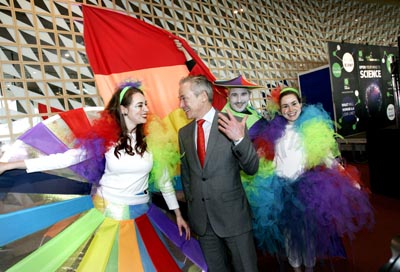At Science Foundation Ireland (SFI) today were (from left) Prof Mark Ferguson, director-general, SFI; Máire Geoghegan-Quinn, EU Commissioner for Research, Innovation and Science, and Prof Pat Fottrell, SFI chairman
Science “forms and informs our path to economic recovery”. That’s according to EU Commissioner for Research, Innovation and Science Máire Geoghegan-Quinn, who was in Ireland this morning to meet with Science Foundation Ireland. She also spoke about the Horizon 2020 strategy and the potential R&D and commercialisation will have to spur on job creation beyond the “parameters of science”.
Geoghegan-Quinn said the next few years will represent a particularly important period for Ireland and Europe in a scientific context.
“In seeking to identify how best to bring about greater competitive advantage and a rise in employment, exports and growth, science has increasingly become a focal point. In my role within the EU Commission, I can see the compelling impact that research and its commercialisation can have and is having beyond the parameters of science. Science, therefore, forms and informs our path to economic recovery,” she said.
As regards Horizon 2020, the European Commission’s proposal for an €80bn EU funding programme to secure Europe’s competitiveness through research and innovation for the period 2014 to 2020, Geoghegan-Quinn also spoke about Ireland’s scientific research agenda and how it must adapt.
“With Ireland remaining on course to reach its target of over €600m funding from the existing EU 7th Framework Programme, the scientific community here must ensure that it adapts and responds to the evolving research agenda as set out in Horizon 2020.”

Ireland’s Minister for Jobs, Enterprise and Innovation Richard Bruton, TD, with St Patrick’s Festival performers Rachel Lally, Vijaya Bateson and Grace Kelly at the official launch of Dublin City of Science 2012 on 26 January. In 2012, there will be more than 160 science-related events happening all over Ireland throughout the year. The highlight will be ESOF 2012 in July, when the world’s scientific community will be descending upon Dublin. In addition, ESOF will host the Europe – US Symposium on the Atlantic Ocean as a shared resource
Dublin City of Science 2012
As Dublin is European City of Science this year, hosting the Euroscience Open Forum (ESOF2012) in July, Geoghegan-Quinn also pointed to how “science has perhaps never been so prominently placed in this country”.
Along with ESOF 2012, Ireland is set to take over the presidency of the European Council in January 2013, so she said this “could not come at a better time, when research and innovation are among the building blocks for economic recovery and growth”.
Ireland’s scientific research climate
Prof Pat Fottrell, SFI chairperson, also spoke about Horizon 2020 today and the aim to position Ireland as a global influencer in the scientific research arena.
“SFI welcomes the opportunities provided by Horizon 2020 and will be working with Ireland’s research community to identify the opportunities to ensure that the available funding will allow for continued research, innovation and economic benefit. SFI-supported researchers have been successful in leveraging further support and investment from Europe,” said Fottrell.
Here’s a sampling of some innovative SFI-supported researchers who are leading EU research projects. The Digital Enterprise Research Institute (DERI) at NUI Galway is leading a multimillion European project on improving citizens’ access to EU policy. Via the Puzzled by Policy project, the researchers are using new web technologies with the aim of supporting democracy and making governments more cost effective and transparent.
Meanwhile, Prof Dan Bradley from the School of Genetics and Microbiology at Trinity College Dublin also recently received a European Research Council (ERC) advanced grant to enable him to continue his research into ancient DNA of domestic animals from archaeological samples. The ‘Codex’ project, ‘Decoding domesticate DNA in archaeological bone and manuscripts’, is using leading-edge genetic tools to build up a ‘DNA data matrix’ of domestic animals over the past 10,000 years.
Bradley believes the matrix could help identify key genetic changes that accompany domestication and subsequent animal management strategies. He also asserts that the research work should also give insights that could be of benefit to the farming sector, as well as disease control and animal productivity.